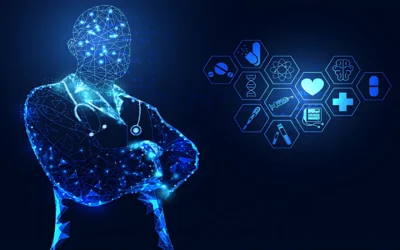Healthcare is undergoing a dramatic transformation—and technology is at the core of it. But many healthcare providers still depend on legacy systems that are functional yet outdated. While replacing them entirely is costly and disruptive, modernizing those systems with AI (Artificial Intelligence) and ML (Machine Learning) can unlock powerful benefits without the need for a complete overhaul.
The Legacy System Dilemma in Healthcare
Legacy healthcare software often suffers from:
- Limited interoperability and data sharing
- Manual, repetitive administrative tasks
- Outdated user interfaces and workflows
- Lack of predictive analytics and automation
These challenges slow down operations, reduce care quality, and lead to missed opportunities in patient engagement and operational efficiency.
The Smarter Way Forward: Enhancing What You Already Have
Instead of a rip-and-replace approach, organizations are now choosing to augment existing systems with AI/ML capabilities—making them faster, smarter, and future-ready.
This approach is:
- Cost-effective
- Less risky
- Scalable
- Focused on solving real pain points
How AI and ML Can Transform Your Healthcare Systems
Here are practical use cases where healthcare organizations can benefit by integrating AI and ML into their current workflows and platforms:
1. Clinical Risk Prediction & Preventive Care
Train ML models on historical patient data to predict future risks and enable early interventions.
Example:
Identify patients at high risk of readmission, enabling proactive care management.
2. AI-Driven Claims & Billing Optimization
Use machine learning to detect anomalies in medical claims, reduce denials, and streamline processing.
Example:
Automatically flag inconsistent billing codes or outlier claims before submission.
3. Virtual Health Assistants
Integrate AI-based chat interfaces into your existing patient portals to improve engagement and self-care.
Example:
An intelligent assistant that provides medication reminders, answers common queries, or schedules appointments.
4. Remote Monitoring & Alert Systems
Combine wearable device data with AI to enable continuous health monitoring and alert clinicians when intervention is needed.
Example:
Real-time alerts for irregular heartbeats or elevated glucose levels in chronic care patients.
5. Computer Vision for Imaging Support
Enhance diagnostics by applying deep learning to medical images like X-rays, CT scans, and MRIs.
Example:
AI highlights suspicious regions in radiology images to assist radiologists in diagnosis and reporting.
6. Clinical Workflow Optimization
Use predictive analytics to identify bottlenecks in care delivery and optimize staff allocation or patient throughput.
Example:
Forecast high-traffic periods in ER and adjust staffing schedules accordingly.
7. Personalized Patient Outreach
Leverage AI to segment patient populations and tailor communications for preventive care and chronic disease management.
Example:
Automatically send flu-shot reminders to at-risk demographics in your database.
A Collaborative, Custom Approach
Modernizing with AI/ML doesn’t mean using off-the-shelf tools. It means working together to co-create intelligent systems tailored to your unique operational challenges and regulatory requirements.
Whether it’s enhancing your EHR, automating back-office tasks, or enabling smart patient engagement—we focus on understanding your environment first, then collaboratively designing AI/ML enhancements that align with your clinical and business goals.
The Road Ahead
- Boost diagnostic accuracy and decision-making
- Improve patient outcomes and satisfaction
- Reduce operational costs and manual workload
- Streamline processes and increase efficiency
- Ensure compliance with evolving healthcare regulations
AI and ML aren’t future technologies—they’re tools that can help your organization perform better today. You don’t need to replace your legacy systems to start benefiting. By strategically integrating intelligence into your existing setup, you unlock new capabilities while preserving stability.
Let’s start a conversation. Together, we can explore how AI and ML can transform your healthcare systems—one step at a time.
Contact us today to explore the possibilities.




